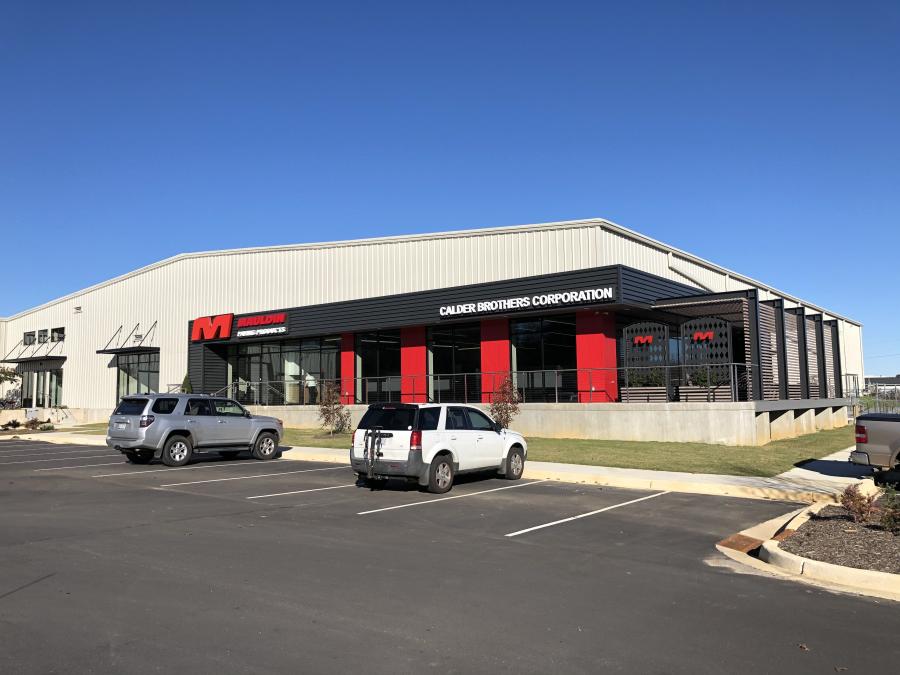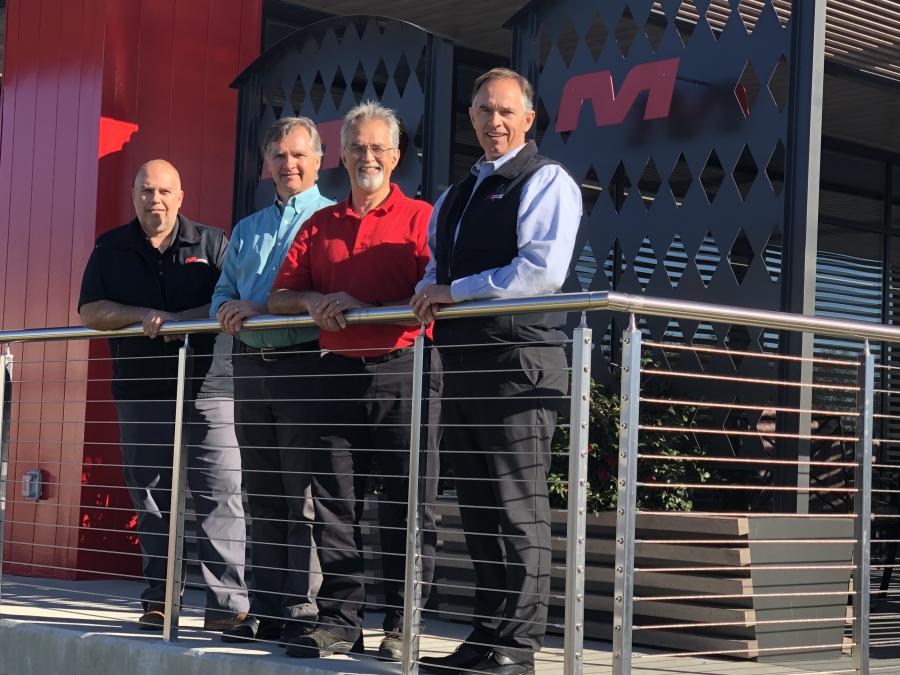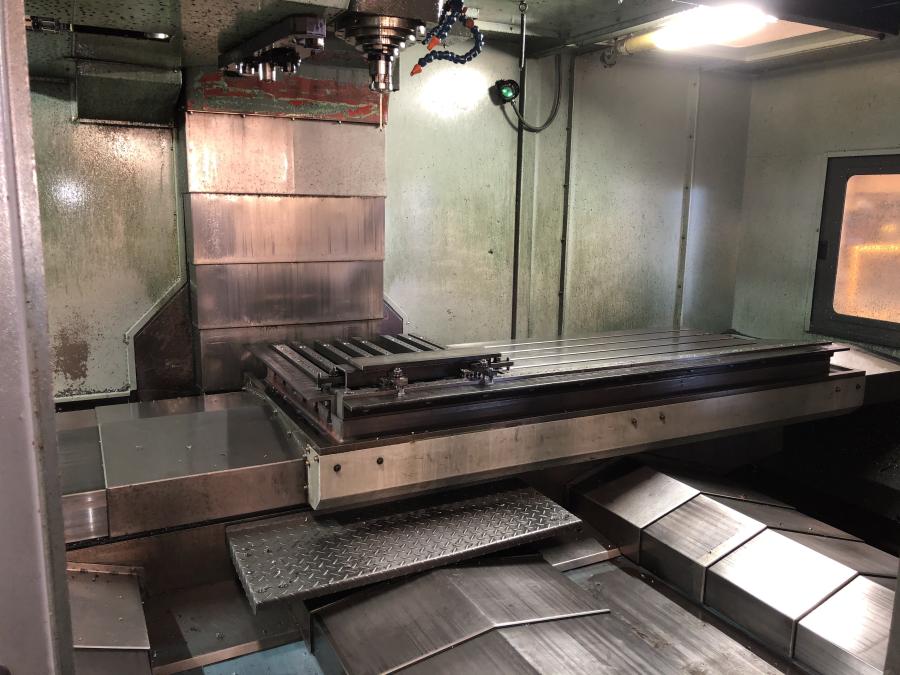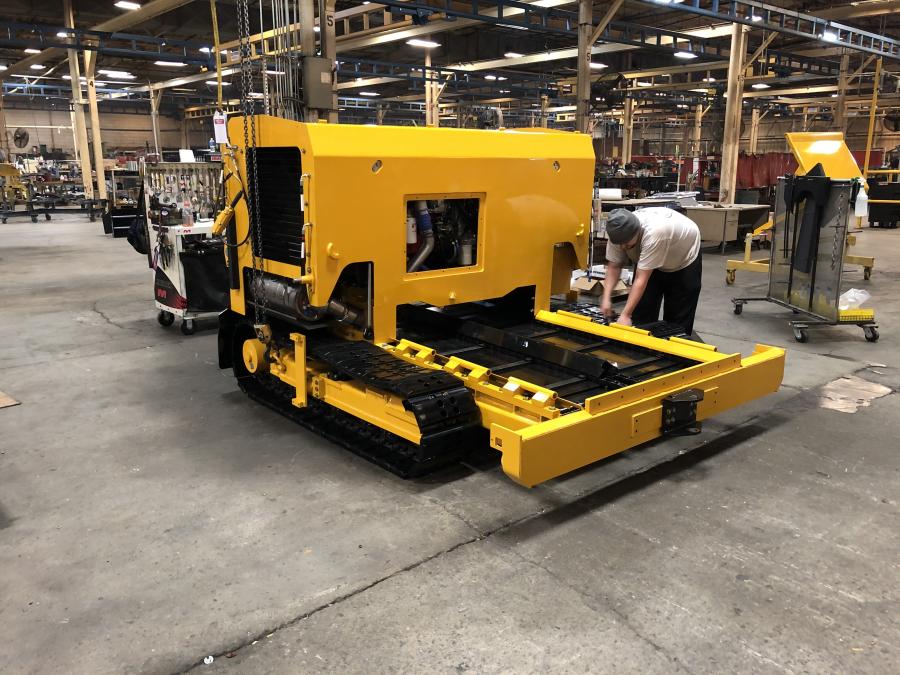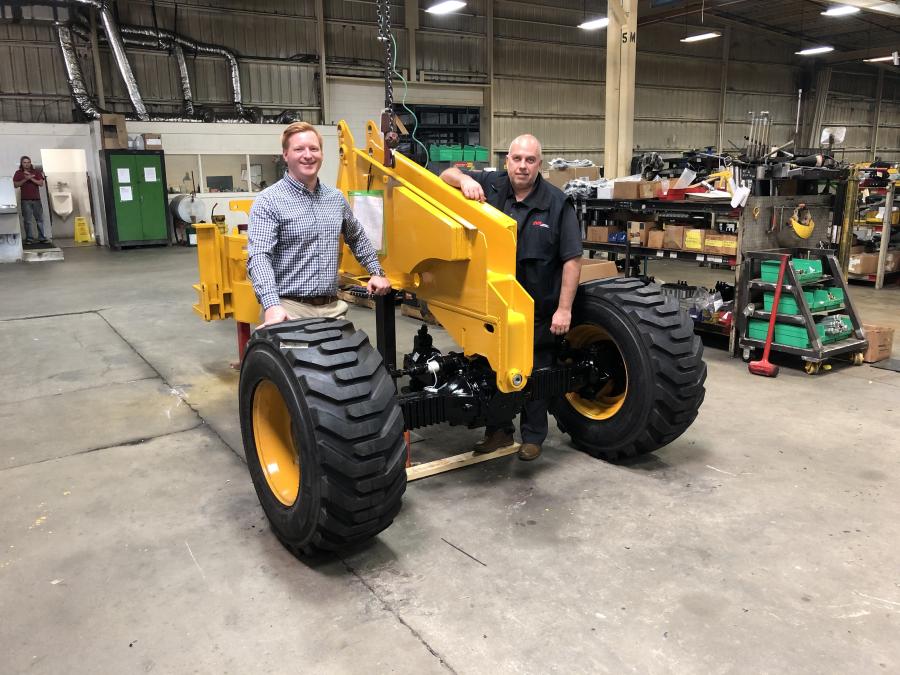The factory and headquarters for Mauldin Paving Products is at 450 East Warehouse Ct. in Taylors, S.C.
In 2019, a South Carolina manufacturer lifted the curtain on three new commercial class paving machines that, in terms of engineering and performance, rank among any made by much larger equipment makers.
Mauldin Paving Products used a national product showcase to introduce its new, redesigned heavy paver, the 1860 model, noted for possessing more power and capacity. In addition, the maker released its new 1560 commercial paver re-engineered with an electrically heated screed as a standard feature, replacing the long-running 1550-D model. The third new Mauldin making its debut in 2019 was the model 650 gravity fed paver with a Tier IV engine.
Their introduction into the marketplace is a testament to how far Mauldin Paving Products has advanced as a company in just over 25 years. A struggling family paving and compaction equipment maker in 1994 that had limped along for several years, Mauldin was purchased that year by another family group with the necessary capital and engineering skills to turn the company's fortunes around.
Robert Calder and three of his sons, Glen, David, and Cameron, acquired ownership in Mauldin Brothers Equipment Co., which had been founded by Neil and Gene Mauldin in the early 1950s. Along with the eldest Calder brother, Wayne, who joined in 2000, the four siblings have operated Mauldin Paving Products ever since. From the beginning, Robert made the decision to act solely in an advisory capacity in the business.
Shortly after buying Mauldin, the family company changed its name to Calder Brothers Corporation and continued producing and upgrading its paving line from its factory in Greenville, S.C.
Today, David Calder is the manufacturer's vice president of design and engineering; Glen is the vice president of operations; Wayne serves as vice president of manufacturing engineering; and Cameron is vice president of product and marketing.
Company Grew Based on Robert Calder's Vision
When the Calder family purchased Mauldin, they produced the company's paving products in a confined, 45,000-sq.-ft. factory.
But a massive growth spurt for Mauldin Paving inevitably led to the company outgrowing its original home and moving operations across the highway to its new and expanded building.
"That was one of my father's main contributions in his advisory capacity for us," said Cameron Calder. "He gave us a vision for moving into this facility. We were clearly out of space in the other building — this is four to five times larger than that was — so he knew that that was the right move at that time. It has allowed us to expand and to grow the business.
"Oddly enough, we later found ourselves in the same situation in this facility when we again outgrew the existing office space," he said. "We had three or four people sharing one office or one person in a very small space. Not only did we fix that by expanding our office square footage, but we also wanted to ensure that we were creating an environment that is attractive to someone in the market for a job."
Calder said the company envisioned a workspace that increases employee productivity and enhances performance, while also giving them a good feeling when they come to work each day.
"That was behind the push to execute the expansion the way we did it," he said while speaking outside on a terrace at Mauldin Paving. "This outdoor patio, for example, is not something that is required, obviously, but it allows us the opportunity on a nice day like this to work outside, make private phone calls or eat lunch. It's designed to give employees some flexibility."
The revamped Mauldin Paving offices/factory also have allowed the company to structure its own in-house product training facility, something that it had not had before. In the past, Calder said, such instruction was given in the warehouses where tables and chairs were set up and portable heaters used. At other times, the manufacturer rented hotel conference rooms and ballrooms to train.
With the updated facilities, all instruction is now done adjacent to the factory.
Calder Brothers Redefine Mauldin
The old Mauldin company targeted the residential and commercial market with a line of paving and compaction equipment, not too different from what is offered today, according to Cameron Calder. On closer inspection, though, Mauldin has changed quite a bit since his family's involvement, he said.
"At that time, the compaction line was a much bigger portion of [Mauldin Brothers] company's portfolio, accounting for about 40 percent of the annual sales," he said. "We were finding that the changes in the compaction industry, prior to us acquiring Mauldin, had really eclipsed the products that they built, and it wasn't our core area of focus. So, we phased out all but the smallest driveway rollers, which we continued to produce here up until this year."
Instead, Calder Brothers set on making profound product enhancements through the intervening years with its paving equipment. The line was completely revamped and expanded along the way, including adding motorgraders and asphalt distributors to its catalog. Cameron Calder said they also took that oil distributor technology and developed their own smaller liquid tank products, known as Tack Tanks.
Versatile Mauldin 1860 Top of the Line
Today, Calder Brothers considers its premier paving machine to be the model 1860, engineered to increase product performance and maintain ease-of-use for its operators.
That's also the opinion of most paving contractors — the Mauldin 1860 is the leader in its class as compared to those produced by other manufacturers.
"It should be considered in the top end of the commercial class and that's a segment that has just changed so much since we acquired this company," Calder said. "It was a small portion of the segment then, but is the biggest slice of the pie today."
The 1860 replaces the long-running 1750-C and is powered by a Cummins 110HP Tier IV Final engine. The redesigned tractor now has a larger 9.5-ton material capacity. The new lower conveyor utilizes heavy-duty greaseless heat rated bearings designed for longer life, meaning less maintenance and downtime.
"If you are going to be in the commercial class, you want to be able to bump up to the mainline road segment," he said. "So, the 1860 has the heaviest screed in its class at 4,500 pounds and extends from eight feet to 15.5 feet. What that allows a contractor to do is he can work on residential projects all the way up to road work, which is really going to cover him from start to finish. The key there is the screed that gives him the means to move back and forth between different paving projects."
The Mauldin 1860's screed features a mat quality and density that has become the preference for many paving contractors and their clients, Calder said, because it means jobs do not have to be redone. The manufacturer offers a four-auger feed system which maintains a much more constant production rate and less work for users as they are paving the project. Competing pavers in this class only have two augers, he said.
Also new for the 1860 are two, five-in. digital displays on each operator stand. They help bring the necessary gauges, auger controls, and screed heating controls to the operators' fingertips.
Improving the visibility on each one of Mauldin Paving's models has been central to its engineering improvements.
"The distributors, for instance, went through a big operator interface overhaul three years ago as we took advantage of what is available from current technologies," he said. "We wanted to simplify the controls for quick and easy use. The system it replaced had a small display screen that was a common design among equipment at the time — a basic green screen with black letters. Today, the equipment has multi-color displays like those you see on electronic dashboards in new cars. Having those in our equipment makes it much easier for operators to, at a glance, see and understand the display."
Four Lines on the Market
From its upstate South Carolina factory, Mauldin currently produces different lines of mobile machines to assist contractors in completing precision paving projects. They include:
- Five pavers (models 650, 760, 1360, 1560 and 1860),
- Four asphalt distributors (models MT300/600, MU-600, MU-1000, and the Precision Sprayer),
- The M415XT Maintainer Grader,
- • Compaction Rollers (models 3500, 6000 & 6000 combi).
Each of these products can be purchased, rented and serviced from Mauldin Paving's dealers in towns and cities from coast-to-coast across the United States and Canada.
A Family Quest
According to Calder, identifying and purchasing a company that the family could run together more than 25 years ago was what led to today's hugely successful line of Mauldin products.
"I think one of the things that makes it work is because of the way we grew up," he said. "We moved around a good bit as kids and when we each turned 18 and went off to university, we were spread out and only able to see each other once or twice a year. We remained close, but not physically close, so there was just a drive and desire to own a business together."
After a period where the Calder family had no luck in finding the right business for them to buy and operate, Cameron Calder said they had to "take a pretty rash approach to" the task. He and Glen had been working for a company in Kansas City from which they both resigned to devote their energies to a full-time search for a suitable acquisition.
"Our thinking was that since our family was from the eastern half of the country, we would focus on east of the Mississippi River," he said. "We also liked the economic climate that was blossoming in the Southeast."
But the Calder family's main criteria for an acquisition was finding a troubled company that could be re-engineered into a successful one.
Mauldin Brothers Equipment fit that description perfectly.
"We wanted to build a product out of a product line; we did not want to have a job shop that produced one-off machines," Calder said. "We wanted a product line that we could be working to constantly tweak, improve and advance. But we were also looking for a business that was in some amount of distress, an ownership structure that needed an exit strategy, and one that we could afford to buy. Mauldin checked all those boxes for us."
In the latter part of the 1980s, Neil Mauldin's company had undergone a rough period that led to the product line suffering as far as quality and support. Still, the Calder family realized that Mauldin Equipment was an established brand name, so they had to decide if they were going to fix what was wrong with the paving line and keep the brand or determine the brand was so badly tarnished that it needed to be thrown out.
"We don't compare ourselves to Harley-Davidson, but the situation we were in was like that [in the 1970s] for the motorcycle manufacturer," Cameron Calder said. "Harley-Davidson has always been a well-known name, but it had a reputation for something bad. Rather than throw out the name, they fixed the problems and that's the same strategy we took with Mauldin."
Engineered to Perfection
From there, he said the family's philosophy has been to make sure Mauldin Paving's equipment is built the same way every time so that it remains a machine that contractors can rely on. After that, Calder Brothers could focus on bringing meaningful, best in class features to its customers.
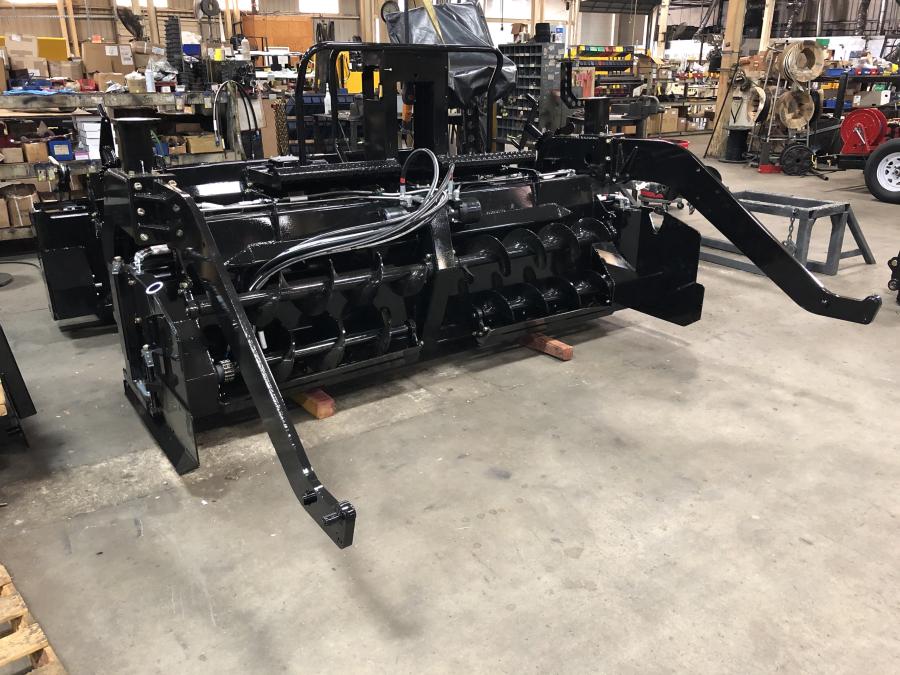
"I talked earlier about our four-auger systems, but that was not something we invented by any means; that was Neil Mauldin's concept from the 1970s," said Calder. "But it feeds material very well to a screed, there's no doubt about that. What we did was look at the screed and think ‘OK, what's available among manufacturing technologies today that is so different from when the screeds were first designed?' We found that they were designed when the high-end manufacturing equipment was simply too expensive to build for small- and medium-sized equipment makers. So, we redesigned our screeds to take advantage of all the high-end manufacturing equipment we had invested in the company. That allowed us to manufacture a world-class screed."
Robert Calder lent his sons his wealth of engineering and business expertise, helping guide them along the path to realizing their manufacturing goals for the reimagined equipment maker.
"He was an unbelievable advisor to us early on in our formation of long-range strategies and vision," according to Cameron Calder. "One of the things he told us was to be the best manufacturer at welding together — not gluing, not bolting, not assembling — but welding incredibly complex pieces at low volume because that is a protected niche, one that would allow us to be successful. It doesn't matter if it is in paving equipment or oil-drilling equipment."
The factory and headquarters for Mauldin Paving Products is at 450 East Warehouse Ct., Taylors, S.C.
For more information, call 864/244-4800, or visit www.4amauldin.com. CEG
Eric Olson
A writer and contributing editor for CEG since 2008, Eric Olson has worked in the business for more than 40 years.
Olson grew up in the small town of Lenoir, NC in the foothills of the Blue Ridge Mountains, where he began covering sports for the local newspaper at age 18. He continued to do that for several other dailies in the area while in college at Appalachian State University. Following his graduation, he moved on to gain experience at two other publications before becoming a real estate and special features writer and editor at the Winston-Salem Journal for 10 years. Since 1999 he has worked as a corporate media liaison and freelance writer, in addition to his time at CEG.
He and his wife, Tara, have been married for 33 years and are the parents of two grown and successful daughters. His hobbies include collecting history books, watching his beloved Green Bay Packers and caring for his three dogs and one cat.
Read more from Eric Olson here.
Today's top stories



